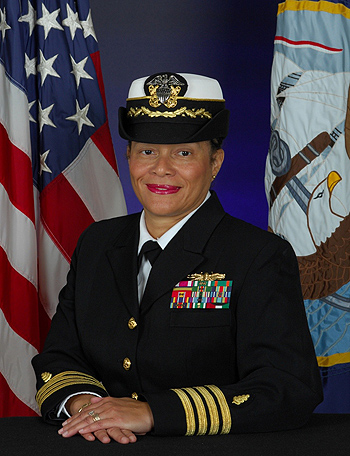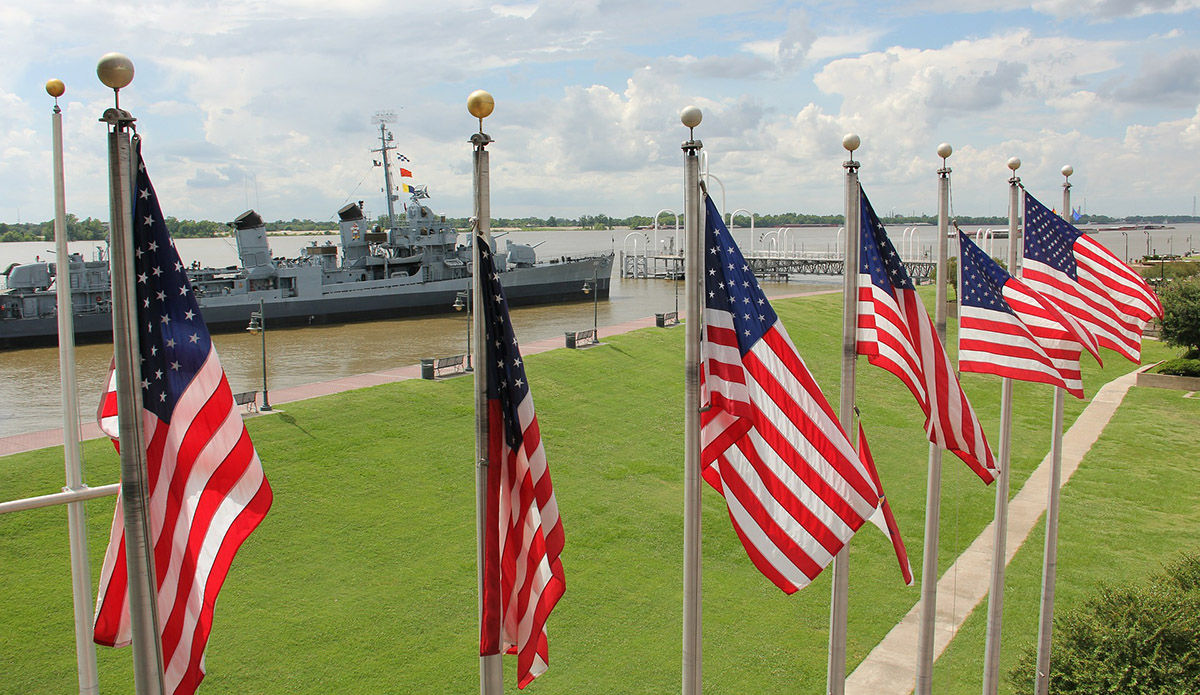Wanda Richards, Leader for AAACN and U.S. Navy
 CAPT (Ret) Wanda Richards |
Nursing Without LimitsA profile of AAACN Leader Wanda Richards‘If there was a conflict, our days were busy and long. CAPT (Ret) Wanda Richards, PhD, MPA, MSM, BSN, is one of AAACN's most admired and respected leaders. |
What motivates you as a human and as a nurse? You've had an amazing career.
What motivates me is that I wake up with a purpose in life and I am to instill that purpose into someone else’s life! If you do not have a purpose in life, then there is no need for you to get out of bed, because you are nothing to yourself or anybody else.
My motivation as a nurse is to nourish an individual’s needs, understand their feelings, respect that person as a human being, and accept them for who they are. There is no difference between you and I, we are the same and God loves us all no matter what!
What led you to become a nurse?
I was inspired by two individuals whom I admire dearly: My mother and my aunt. My mother worked for 30 years as an OB/GYN office nurse. As a young girl growing up in Valdosta, GA, I remember her going to work at the Doctor’s Building in her white uniform, stockings, and spotless white shoes.
Now that I think back, it was then that I was first introduced to ambulatory care nursing. As a child, I didn’t realize in my adult years I would become one!
My aunt also worked 30 years on an inpatient OB/GYN unit. Through my childhood and teens, I would periodically visit her during the summer in Washington, DC. This was an exciting time for me because I got to hear about her experiences.
I was always told by both my mother and aunt, “The sky is the limit. You can be whatever you want to be as long as you set your mind to it and keep God in the forefront. Both of these extraordinary ladies influenced me to be the person I am today.
You began your career in OB/GYN, then med-surg. You then entered the Navy in 1983. Why did you choose a military path?
I started working in OB/GYN as young teen prior to college. I was working in the same doctor’s office as my mother. When her boss heard that I wanted to attend nursing school, he hired me, and yes, it was my mother who trained me! She taught me how to be a great office nurse. Once again, I had an early introduction to ambulatory care and I didn’t realize it.
After that job, I was employed on an OB/GYN inpatient unit as a nursing assistant during my college summer break. I also worked on the med-surg inpatient unit on weekends during my senior year. I then became a nursing supervisor before I joined the Navy in 1983.
My reason for joining the Navy was twofold: My brother, MSGT Wilbur E. Castleberry Jr., was a recruiter for the United State Marines Corps and I was ready to do something different with my life and take it to the next level. My plan was to do travel nursing or join a military branch of service. My mother and aunt again reminded me to reach higher and suggested I discuss a military career with my brother.
I told my brother my plans, keeping in mind the Navy Medical Department supports the Marines. I had applied to the Air Force and was waiting for my paperwork to be processed when I received a phone call from a Navy recruiter. She told me my brother asked her to sign me up for the Navy and she was standing by to do it! Needless to say, that started my Naval career.
Tell us about serving in Kuwait and Iraq.
The role of the Nurse of the Day in the Navy is the same as a nursing supervisor. This individual represents the Director for Nursing Service after hours. The Nurse of the Day is responsible for patient movement within/outside of the facilities and other Military Treatment Facilities (MTFs), as well as the overall safety of the patients and staff.
Being deployed in Kuwait and Iraq was very rewarding for me, as I helped take care of our wounded and fallen Marines, sailors, and soldiers. I was assigned to the Casualty Receiving Unit as the senior nurse working with other nurses and corps staff.
If there was a conflict, our days were busy and long. We never knew what to expect. We had to always be prepared for the unknown.
While I was in Iraq, the CNN Atlanta camera crew was accompanying our unit. One day, an enemy soldier was captured and brought to camp. He needed immediate medical attention. The neurosurgeon who operated on him was Dr. Sanjay Gupta, CNN’s medical expert, who was filming the war at the time.
One event that affected me deeply involved a reservist sergeant who was injured on a convoy back to camp during an enemy attack. He sustained a gunshot wound to his head and became unconscious shortly after arriving. Dr. Gupta told us all we could do was make him comfortable and wait.
The Chaplain was called, we sang hymns, held his hands, prayed, and talked to him. As this occurred, I created a makeshift private area for him and assigned someone to be with him until he passed.
I was amazed and awed by how the nurses and corps staff gathered round and took shifts to make sure the sergeant wasn’t alone. Every so often, he squeezed our hands. We were there until he took his last breath. Afterward, a debriefing session was conducted to ensure all staff members were physically, psychologically, and spiritually ready to care for other patients.
"There are days when I think back over my time in Iraq, and this young man still comes to mind and brings tears to my eyes. Deep down I know his transition was peaceful because of our team. This is what teamwork and nursing is about … caring for patients and putting them first, whether it’s on the battlefield, in the air, on a ship, or in a brick and mortar facility. We truly care!"
There are days when I think back over my time in Iraq, and this young man still comes to mind and brings tears to my eyes. Deep down I know his transition was peaceful because of our team. This is what teamwork and nursing is about … caring for patients and putting them first, whether it’s on the battlefield, in the air, on a ship, or in a brick and mortar facility. We truly care!
You then worked in Washington, followed by Walter Reed in Bethesda, in 2006, where you practice now. Tell us about that path.
Working as a nurse at our command headquarters (Bureau of Medicine and Surgery), I worked for one of the most powerful men in naval medicine, the Director of M8 (Financial Department).
The work was both challenging and rewarding. My subject matter expertise as nurse was instrumental with assisting in other areas with statistics and reporting data from the MTFs. It was an eye-opener for me to see how funds are allocated throughout the Navy Medical Department. The challenging part was learning all of the financial terms and how to apply them.
Describe what you do now, what you love most about it, and what the greatest challenges are.
After retiring from the Navy and finishing my PhD, I decided to go back into the workforce to do what I love best: Mentoring and teaching young nurses and enlisted staff.
I currently have the best job a retiree can have and I love every minute. I’m a Program Director/Nurse Educator for a large MTF in Bethesda, MD. I wear several hats: In addition to being a Program Director, I’m also one of several instructors for the Trauma Nursing Core Course (TNCC) for active duty, reservists, and civilian registered nurses who are trained to use their critical application skills and assessment acumen to manage unique patient situations.
It’s a great opportunity to train these nurses so they’re equipped with the right tools to save lives by learning and practicing a systematic and standardized approach to care. The beauty of this training is that it can be used anywhere on and off the battlefield - in hospitals, on ships, in ambulatory care centers, and more.
My second hat is teaching the nurse preceptor development and charge nurse courses. In these two courses, nurses are introduced to those roles, taught to handle the challenges, and provided with tools for conflict management and time management.
My final hat is teaching a Joint Enlisted Medication Administration Course (JEMAC). It is important to educate, train, and verify the competence of our enlisted staff who are authorized to administer medications at this MTF.
I love watching our new enlisted staff and nurses absorb new knowledge. It’s inspiring how eager they are to learn in order to take better care of those on active duty, as well as our beneficiaries and veterans. I often remind them that our patients are at the center of everything we do.
How did you find AAACN? What has your involvement done for you personally and professionally?
I was first introduced to AAACN in 1995 when I attended my first conference in Washington, DC. My involvement started with a poster presentation for the Tri-Service Military SIG, then a podium presentation. In subsequent years, I served on the Program Planning Committee and several task forces. I have been on the AAACN Board of Directors since 2013, with my term ending this year.
I’ve watched AAACN grow over time, with my friendships and roles nurturing me to become a leader in ambulatory care nursing. Without the mentorship of these leaders, I would have never have thought of writing articles for Viewpoint and co-authoring a chapter in the Core Curriculum for Ambulatory Care Nursing, 3rd Edition. Writing for the Core inspired to me help others write for the new 4th Edition of the Core.
As far as being an inspiration to others, it gives me a great feeling when other nurses seek me out to talk about ambulatory care, or when someone says, “I admire you for who you are and what you do.”
Why did you become a leader?
Oh wow, I really did not become a leader, it became me! I do not see myself as a leader, I see myself as an individual who looks at the overall situation and determines the best outcome for colleague, friends, family, patients, and staff.
What would you tell another nurse who was considering working in the military?
"I’ve traveled to places I would have never gone if I remained in the civilian sector. My jobs in the military have been so incredible and rewarding, calling for duties that transcended traditional nursing roles."
I would first ask them to clarify why they wanted to join, what their goals are, and are they willing to support the missions and travel.
Then, I would let them know, joining the Navy was the greatest thing that ever happened to me. I was introduced to my husband, met friends, and so many people across the globe, many of whom I still have relationships with today.
I’ve traveled to places I would have never gone if I remained in the civilian sector. My jobs in the military have been so incredible and rewarding, calling for duties that transcended traditional nursing roles. I have to attribute to the military for giving me the inspiration and fortitude to further my education. Being in the military has its up and downs, advantages and disadvantages, but the sky is the limit!
Reported by Janet Perrella-D’Alesandro - AAACN communications director and enews managing editor.

